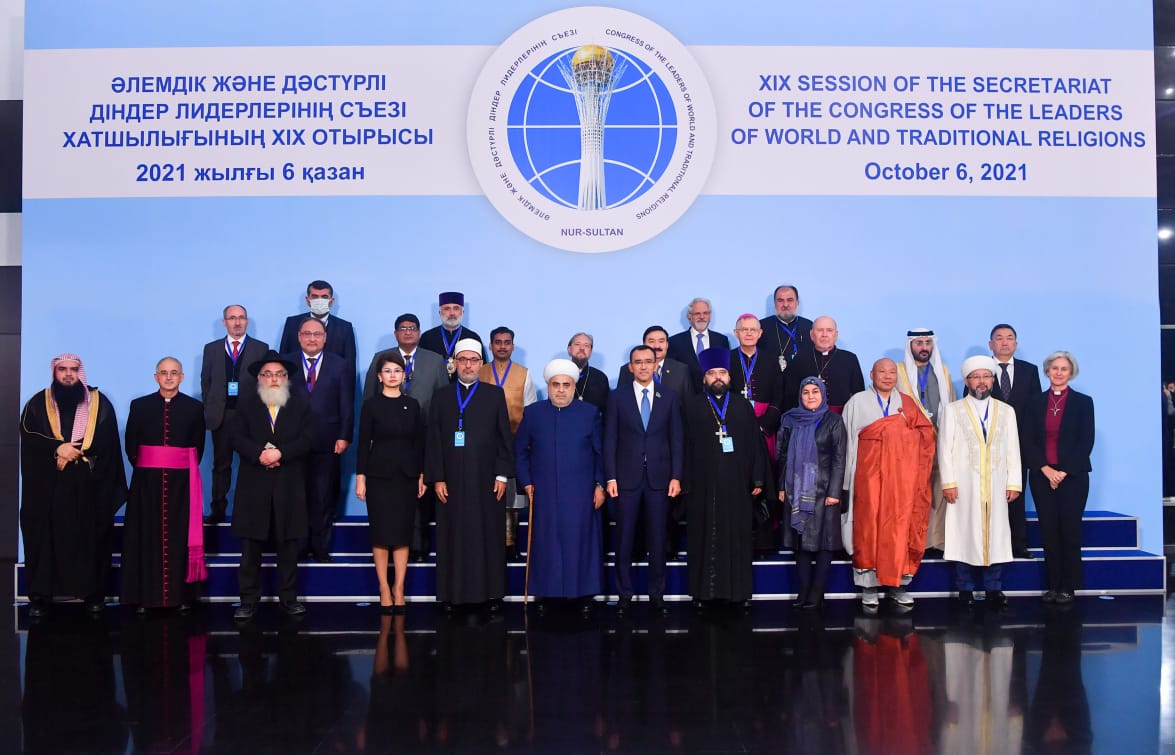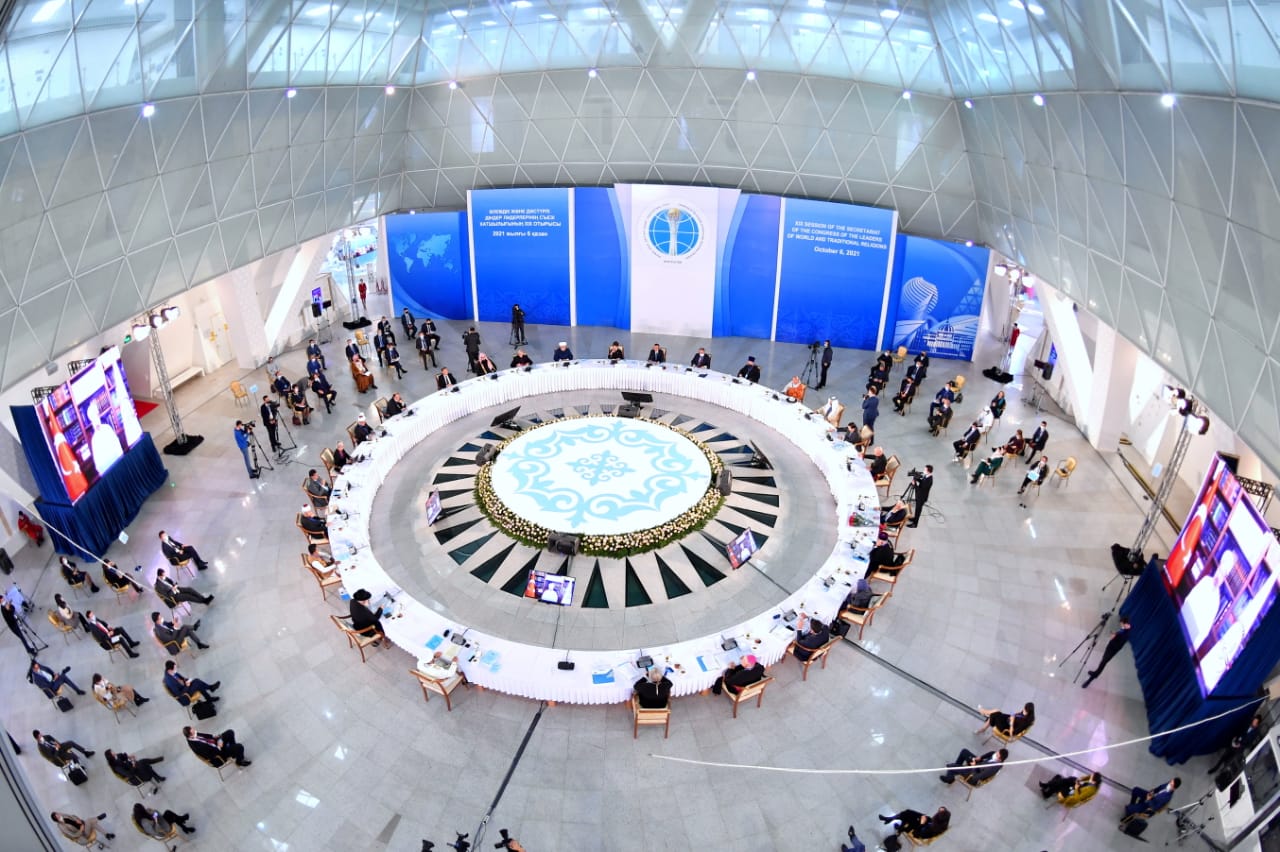NUR-SULTAN – The seventh Congress of the Leaders of World and Traditional Religions will be held Sept. 14-15 in 2022 in Nur-Sultan. This was announced at the 19th Session of the Secretariat of the Congress of Leaders of World and Traditional Religions, which took place on Oct. 5-6.

In their speeches, religious leaders noted the high importance of the work carried out by Kazakhstan to establish interreligious and interfaith dialogue not only within the country, but also at the international level. Photo credit: press service of Nazarbayev center.
The representatives of world religions and confessions such as Islam, Judaism, Buddhism, as well as Orthodox Christians, Catholics, Protestants from 20 countries including Egypt, Saudi Arabia, Turkey, Pakistan, Iran, Israel, Armenia, Russia, Vatican, United Kingdom, Mongolia, Thailand, South Korea, China, Japan, India, United Arab Emirates, Azerbaijan. Representatives of international organizations also attended the secretariat session.
This year’s agenda includes issues related to resolving global crises in view of new challenges and global opportunities. Above these issues, leaders discussed the importance of the congress in terms of post-pandemic world development, defined the format of the Final Congress Document and spoke about the Kazakh model of interethnic and interreligious harmony in a global interreligious and intercivilizational dialogue.
The opening ceremony began with the welcoming address from Maulen Ashimbayev, Head of the Congress Secretariat and Chairperson of the Senate of the Kazakh Parliament.
Ashimbayev said that Kazakhstan has managed to form its own model of peace and national dialogue over the years of Independence, based on the principles of diversity through unity and joint responsibility for the future of the country, respect and ensuring the rights of citizens, regardless of ethnicity and religion.
“The current secretariat is taking place amid difficult conditions – along with the pandemic, other global issues have worsened in recent years. Among them are the intensification of international tensions caused by geopolitical and geo-economic factors, the breakdown of the global security system, as well as the intensification of the arms race and the problems of the global environmental agenda,” Ashimbayev said.
The head of the congress secretariat noted that in these conditions, the key task of spiritual leaders is to establish the correct system of values and unite people behind the ideas of peace, social harmony and mutual support for each other.
The High Representative of the UN Alliance of Civilizations, Miguel Angel Moratinos, shared the viewpoint of Ashimbayev and noted the importance of the congress in terms of discussing the role of religion in society and interaction at the international level to build a sustainable and secure world.
“The unique platform that this initiative provides will constitute a key opportunity for representatives of governments, religions leaders, international and regional organizations, and other relevant stakeholders to reflect collectively about the challenges to inter-religious dialogue and sustainable peace in an increasingly polarized world,” Moratinos said.

The 7th Congress, which will be held Sept. 14-15 in 2022 in Nur-Sultan, is planned to be dedicated to the role of leaders of world and traditional religions in the spiritual and social development of mankind in the post-pandemic period. Photo credit: press service of Nazarbayev center.
Representative of the Minister of Awqaf (Endowments) of the Arab Republic of Egypt Muhammad Al-Shahat Al-Jundi supported Moratinos and said racial discrimination, religious fanaticism and islamophobia are the fundamental problems in the world of religion.
Al-Jundi thinks we have to draw a connection between common human values and common religious values. Love, tolerance, justice and peace should be considered to be the basic ones.
“Only common values would enhance our joint fight against global problems. It is a turning point in worldwide history, when religious leaders can ensure peaceful co-existence among adherents of religion,” he added.
Among the speakers was Muhammad Zia Ul Haq, Director General of the Islamic Research Institute at the International Islamic University from Islamic Republic of Pakistan.
He explained why all global leaders should work together, transparently discuss the current crisis and make prompt decisions. “We meet at a time when dialogue is needed, more than ever. The global security landscape continues to shift dramatically. We face enormous opportunities. We are the first generation that can end global poverty and the last generation that can address global warming before it is too late. But we also face enormous risks, civil conflicts, terrorism, organized crimes, drug trafficking and health crisis, which are threatening billions of people.”
Ul Haq continued, “The 20th century was dominated by ideology, while the 21st century will be famous for identity. This focus from ideology to identity, broad religious affiliations at the center stage of the content really work. For the first time in history on this scale and frequency there are serious efforts at the global level for mutual understanding among world religions.”
Jo Bailey Wells, Representative of the Anglican Church from Bishop of Dorking, United Kingdom, began the discussion of the climate crisis.
As she noted, the ecological problem is even more critical than the pandemic situation, therefore we all should think about what we want to preserve.
“We have inherited a garden – we must not leave our children a desert,” she concluded.

